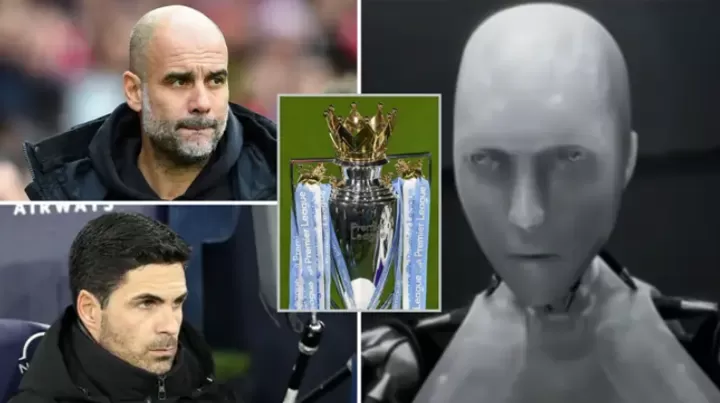Final 2025-26 Premier League Table Predicted by AI

The Premier League continues to captivate football fans worldwide with its unpredictable nature, dramatic storylines, and relentless competitiveness. As we approach the 2025-26 season, the anticipation among supporters reaches fever pitch, with clubs across England’s top flight making strategic moves in the transfer market and preparing for what promises to be another enthralling campaign.
The 2024-25 season delivered its fair share of surprises and confirmations. Liverpool’s triumphant return to the summit of English football, claiming their first league title since the 2019-20 season, provided a fitting narrative of resilience and tactical excellence. Meanwhile, the harsh reality of Premier League football was once again demonstrated as all three promoted teams – Leicester City, Ipswich Town, and Southampton – suffered immediate relegation back to the Championship, continuing a troubling trend that has become increasingly common in recent years.
This pattern of promoted teams struggling to establish themselves in the Premier League has become a source of significant concern for football purists and supporters alike. The financial gulf between the Premier League and the Championship, combined with the increasing tactical sophistication and physical demands of top-flight football, has created an environment where newly-promoted clubs find it increasingly difficult to compete effectively against established Premier League sides.
The AI Revolution in Football Prediction
In an era where artificial intelligence and machine learning algorithms have revolutionized various industries, football analysis has not been left behind. Using advanced AI tools, including X’s (formerly Twitter) Grok AI system, analysts can now process vast amounts of data to generate sophisticated predictions about upcoming seasons. These AI models consider numerous variables, including historical performance data, transfer activity, managerial changes, squad depth, financial resources, and even psychological factors that might influence team performance.
The AI predictions for the 2025-26 Premier League season paint a fascinating picture of potential outcomes, suggesting both continuity and dramatic changes across the league table. While some predictions align with conventional wisdom, others challenge our preconceptions about certain clubs’ capabilities and prospects.
The Relegation Battle: A Tale of Struggle and Survival
20th Place: Leeds United – The Painful Return
Position last season: 1st (Championship)
Leeds United’s anticipated return to the Premier League after their Championship triumph represents both a dream fulfilled and a nightmare in waiting, according to AI predictions. The Whites, who dominated the second tier under Daniel Farke’s guidance, are expected to find the step up to Premier League football insurmountable.
The AI’s analysis suggests that Leeds face a “tough return” and predicts they will “go straight back down, continuing the trend of promoted teams struggling.” This prediction isn’t entirely surprising when considering Farke’s mixed record in Premier League management. While the German tactician has proven himself capable of building successful Championship teams, his previous stint with Norwich City in the top flight raised questions about his ability to adapt his philosophy to the increased intensity and quality of Premier League football.
Leeds United’s potential struggles could stem from several factors. The club’s financial constraints, following years of uncertainty and ownership changes, may limit their ability to make the significant investments required to compete at the highest level. Additionally, the loss of key players to more established Premier League clubs could weaken their squad depth, leaving them vulnerable during the grueling 38-game campaign.
The prediction also highlights the psychological pressure that comes with managing a club with Leeds’ passionate fanbase and rich history. The expectations at Elland Road are always high, and the pressure to perform could prove overwhelming for both players and management if results don’t come quickly.
19th Place: Burnley – The Defensive Dilemma
Position last season: 2nd (Championship)
Scott Parker’s Burnley side, despite their impressive Championship campaign that saw them secure automatic promotion, are predicted to struggle significantly in their return to the Premier League. The AI’s analysis points to a critical weakness that could prove decisive in their battle for survival.
The prediction highlights Burnley’s expected loss of James Trafford, their talented young goalkeeper who kept an impressive 30 clean sheets during their Championship-winning season. Trafford’s departure to a higher-profile club would represent a significant blow to the Clarets’ defensive stability, which formed the foundation of their success in the second tier.
Parker’s tactical approach, which emphasizes defensive solidity and counter-attacking football, relies heavily on having a reliable goalkeeper who can command his area and make crucial saves during periods of sustained pressure. Without Trafford’s shot-stopping ability and distribution skills, Burnley may find themselves exposed against Premier League attacks that are far more clinical and varied than those they faced in the Championship.
The AI’s prediction also suggests that Burnley’s squad lacks the depth and quality required to compete effectively across multiple competitions. While their first eleven may be capable of competing with some Premier League sides, the inevitable injuries and suspensions that occur throughout a season could expose their limitations.
18th Place: Wolverhampton Wanderers – The Cunha Conundrum
Position last season: 16th
The prediction of Wolverhampton Wanderers’ relegation represents one of the more surprising elements of the AI’s analysis. Wolves, who have been Premier League regulars for several seasons, are expected to suffer the consequences of losing their star player, Matheus Cunha, to Manchester United.
Cunha’s 15 goals during the 2024-25 season were instrumental in keeping Wolves in the Premier League, particularly during the second half of the campaign under Vitor Pereira’s management. The Brazilian forward’s pace, technical ability, and eye for goal provided Wolves with a cutting edge that differentiated them from other struggling sides.
The AI’s prediction suggests that Pereira will struggle to replace Cunha’s output, highlighting the challenge many mid-table Premier League clubs face when they lose their key players to bigger clubs. The domino effect of such departures often extends beyond just goals scored, as these players frequently contribute to overall team morale, tactical flexibility, and the ability to change games in crucial moments.
Wolves’ predicted relegation would represent a significant fall from grace for a club that has invested heavily in infrastructure, scouting networks, and player development in recent years. Their Molineux Stadium has witnessed some memorable Premier League moments, and their relegation would be mourned by neutral fans who appreciate their commitment to attacking football.
17th Place: Sunderland – The Unlikely Survivors
Position last season: 4th (Championship)
In what the AI describes as “a surprise turn of events,” Sunderland are predicted to be the only promoted team to survive their first season back in the Premier League since 2017. This prediction defies the recent trend of promoted teams struggling and suggests that the Black Cats possess something special that sets them apart from their fellow newcomers.
Sunderland’s journey back to the Premier League through the Championship play-offs was nothing short of remarkable. Their victory over Sheffield United at Wembley, coming from behind in dramatic fashion, demonstrated the mental resilience and never-say-die attitude that could serve them well in the top flight.
The AI’s prediction credits Sunderland with earning 30 points under Regis Le Bris, which would represent a respectable return for a newly-promoted side. The French manager’s tactical acumen and ability to get the best out of his players will be crucial to their survival hopes.
Key to Sunderland’s predicted success will be the contributions of Wilson Isidor and Eliezer Mayenda in the goal-scoring department. Both players have shown flashes of brilliance in the Championship and possess the pace and technical ability that could trouble Premier League defenses. Their ability to provide consistent goal threats will be vital if Sunderland are to avoid the fate that has befallen so many promoted teams in recent years.
The Mid-Table Mediocrity: Clubs in Transition
16th Place: West Ham United – The Hammers’ Struggles Continue
Position last season: 14th
West Ham United’s predicted drop to 16th place represents a continuation of their recent struggles and suggests that the appointment of Graham Potter has not provided the transformative effect many hoped for. The AI’s analysis points to “inconsistent performances and a lack of major signings” as key factors in their expected decline.
The uncertainty surrounding the futures of Lucas Paqueta and Mohammed Kudus adds another layer of complexity to West Ham’s situation. Both players have been crucial to the Hammers’ attacking play, and their potential departures would leave significant gaps in Potter’s squad that may prove difficult to fill effectively.
West Ham’s struggles highlight the challenges faced by clubs with ambitions beyond their current status but lacking the resources or stability to make significant leaps forward. The Irons have invested heavily in recent years, but their inability to establish consistency in performance and results has left them in a perpetual state of transition.
Potter’s tactical philosophy, which emphasizes possession-based football and fluid attacking movements, may take time to fully implement with the current squad. The AI’s prediction suggests that this transitional period could result in another disappointing campaign for the East London club.
15th Place: Brighton & Hove Albion – The Seagulls’ Unexpected Decline
Position last season: 8th
Perhaps the most shocking prediction in the AI’s analysis is Brighton & Hove Albion’s dramatic fall from 8th to 15th place. The Seagulls’ success under Fabian Hurzeler during the 2024-25 season was one of the feel-good stories of the campaign, with the young German manager proving that age is just a number when it comes to tactical innovation and player management.
Brighton’s predicted decline is described as “a dip in form” that is “possible after a strong 2024/25,” suggesting that their previous success may have been somewhat unsustainable. The AI notes that “some X predictions placing them near the bottom” indicates a potential for even further decline, making their 15th-place prediction relatively optimistic in comparison.
The reasons behind Brighton’s expected struggles could be multifaceted. The club’s model of developing young talent and selling them on for profit, while financially successful, can sometimes leave gaps in the squad that are difficult to fill immediately. Additionally, the pressure of expectation following their excellent previous season could prove burdensome for both players and management.
Hurzeler’s youth and relative inexperience in Premier League management, while previously an asset, could become a disadvantage if results begin to go against him. The AI’s prediction suggests that the learning curve for managing in the Premier League over multiple seasons may prove steeper than initially anticipated.
14th Place: AFC Bournemouth – Treading Water
Position last season: 9th
AFC Bournemouth’s predicted drop from 9th to 14th place represents a significant decline for a club that has worked hard to establish itself as a stable Premier League side. The Cherries’ ability to punch above their weight in recent seasons has been admirable, but the AI’s prediction suggests that maintaining such performance levels may prove challenging.
Bournemouth’s predicted position reflects the reality faced by many smaller Premier League clubs: the constant struggle to compete with teams possessing greater resources and squad depth. Their success has often depended on maximizing the potential of their existing squad rather than making significant additions, a strategy that can be effective but also leaves little room for error.
The club’s commitment to attacking football and their willingness to take risks has endeared them to neutral fans, but it has also sometimes left them vulnerable to stronger opposition. The AI’s prediction suggests that this approach may become increasingly difficult to sustain as the overall quality of the Premier League continues to rise.
The Historical Context: Promoted Teams’ Struggles
The AI’s predictions for the 2025-26 season continue a troubling trend that has become increasingly prevalent in recent Premier League campaigns. The immediate relegation of promoted teams has become so common that it’s almost expected, raising questions about the competitive balance of English football’s top division.
This phenomenon can be attributed to several factors:
Financial Disparity: The gap between Premier League and Championship revenues has grown exponentially, creating a situation where established Premier League clubs can afford to maintain squad depth and quality that newly-promoted teams simply cannot match.
Tactical Sophistication: The tactical demands of Premier League football have evolved significantly, requiring teams to adapt quickly to different styles of play and higher levels of technical ability.
Transfer Market Dynamics: Promoted teams often find themselves competing for players with established Premier League clubs, frequently losing out due to wage structure limitations and the players’ desire to join more stable environments.
Pressure and Expectation: The intense media scrutiny and pressure that comes with Premier League football can be overwhelming for players and staff who are experiencing it for the first time.
The Broader Implications
The AI’s predictions for the 2025-26 Premier League season paint a picture of a league where established hierarchies are largely maintained, with only minor fluctuations in the middle sections of the table. This raises important questions about the competitive nature of English football and whether the current structure adequately rewards sporting merit over financial resources.
The predicted struggles of promoted teams and the relative stability of established clubs suggest that the Premier League may be evolving into a more predictable competition, where outcomes are increasingly determined by financial clout rather than tactical innovation or player development.
However, football’s inherent unpredictability means that these AI predictions, while based on sophisticated analysis, cannot account for all the variables that influence sporting outcomes. Injuries, managerial changes, unexpected breakout performances, and simple luck all play crucial roles in determining final league positions.
Conclusion: The Beautiful Game’s Uncertain Future
As we look ahead to the 2025-26 Premier League season, the AI’s predictions provide a fascinating glimpse into what might unfold over the coming months. While some predictions align with conventional wisdom, others challenge our assumptions about certain clubs’ capabilities and prospects.
The forecast of continued struggles for promoted teams highlights ongoing structural issues within English football, while the predicted decline of previously successful clubs like Brighton demonstrates the challenges of maintaining momentum in an increasingly competitive environment.
Ultimately, these predictions serve as a starting point for discussion rather than definitive statements about the future. The beauty of football lies in its unpredictability, and the 2025-26 season will undoubtedly provide its own unique storylines, surprises, and moments of brilliance that no AI model can fully anticipate.
As fans, we can only wait with bated breath to see how these predictions compare to reality, knowing that the actual season will likely provide twists and turns that no algorithm could have foreseen. The Premier League’s capacity to surprise and entertain remains one of its greatest assets, ensuring that regardless of what the AI predicts, the 2025-26 season will be worth watching from the first whistle to the last.















